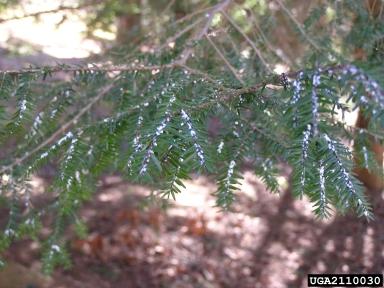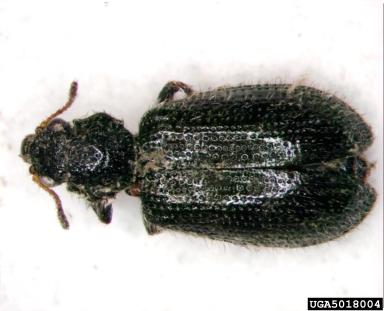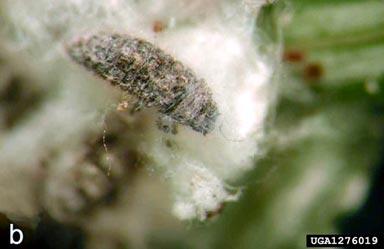Laricobius Beetles to Control Hemlock Wooly Adelgid
Biological Control: 2008 - 2014

Photo: James Johnson
Laricobius nigrinus is a small, black beetle that is native to the Pacific Northwest region of the United States. These beetles have been found to be predators of hemlock woolly adelgid, a serious pest of hemlock trees, which is currently destroying hemlock forests in the eastern United States. Extensive laboratory and field tests were performed by the USDA to determine if the beetles could help control hemlock woolly adelgid in the eastern United States. The tests showed that the beetles had a narrow host range; therefore, they were approved by the USDA for field release in 2000. Hemlock woolly adelgid was first found in eastern Kentucky in 2006 and since then we have been exploring ways to control this pest. We have used chemical treatments in some areas, but biological control can be preferable for many reasons since it does not require chemicals to be introduced into the environment and, once established, biological control agents can be a long-term and sustainable solution to the problem.
In 2008 and 2009, we made trips to Seattle, Washington to collect Laricobius beetles in the field. The collected beetles were then released in the forests of eastern Kentucky. In addition, there are several laboratories that are raising Laricobius for release and in 2010 we received beetles from these labs to release in the forests since we did not collect in Seattle that year. In 2011 we released beetles that were collected in Seattle in the spring. Scientists have had great success getting these beetles to establish in North Carolina, so starting in 2011, we began collecting beetles there and have made 1-2 trips each year since our initial collecting trip in fall 2011.
HWA and Laricobius populations were both dramatically reduced in 2014 after the polar vortex early that year. Collection sites were not productive in 2014; therefore, we did not take collecting trips to North Carolina. We focused on surveying for new HWA populations and trying to recover Laricobius. No beetles were recovered in 2014.
Numbers of Laricobius beetles released
-
2008: 700
-
2009: 1142
-
2010: 500
-
2011: 1362
-
2012: 6085
-
2013: 3387
It is too early to determine if the beetles have had an impact on the pest population. However, we have revisited some release sites in eastern Kentucky and were able to recover some beetles.
2012
- March: recovered 3 Laricobius larvae
- December: recovered 4 Laricobius adults
2013
- March: recovered 3 Laricobius adults
- November: recovered 1 Laricobius adult
The Kentucky Division of Foresty is now managing this biological control project.

Photo: PA Dept Conservation and Nat Resources

Photo: Gabriella Zilahi-Balogh
